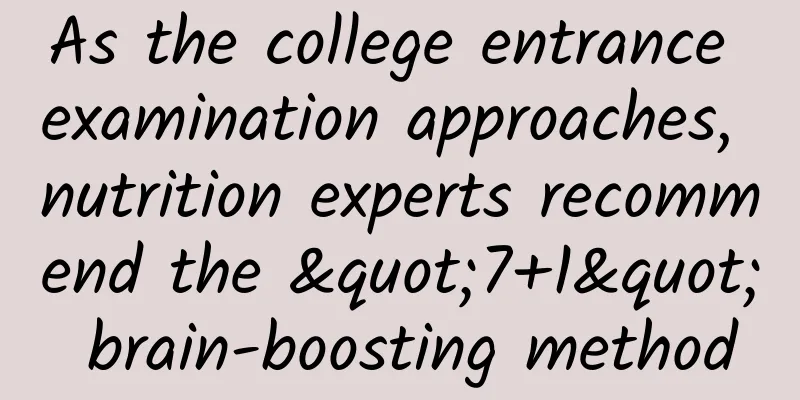As the college entrance examination approaches, nutrition experts recommend the "7+1" brain-boosting method

|
As the college entrance examination approaches, many parents are worried about how to prepare nutritious meals for their children. Today, we invite nutrition experts to give parents and candidates some tips on how to prepare meals for the exam in a scientific and reasonable way. College entrance examination candidates should pay attention to immunity and brain nutrition For students who are about to take the college entrance examination, He Jiguo, former director of the Department of Food Nutrition and Safety at China Agricultural University, suggested that college entrance examination candidates should pay attention to two aspects: immunity and brain nutrition. First, basic nutrition should be ensured, such as sufficient sugar to ensure the energy supply of the brain, and sufficient protein, vitamins and minerals to maintain the body's immunity and the consumption of nerve activity; second, foods containing lecithin such as egg yolks, soybeans, nuts, etc., and foods containing omega-3 fatty acids such as marine fish, especially deep-sea fish, and flaxseed oil. When asked which components in walnuts are good for brain nutrition, He Jiguo introduced that walnuts are rich in various nutrients that are beneficial to the brain, such as linoleic acid. Linoleic acid can form arachidonic acid through chain elongation and olefination, and further converted into prostaglandins, which have the effects of dilating blood vessels and reducing platelet aggregation, thereby promoting blood fluidity and ensuring blood supply to the brain. "Walnuts and other nuts contain a certain amount of alpha-linolenic acid, but the content is not high. Alpha-linolenic acid belongs to the omega-3 fatty acid and can be converted into EPA through chain extension. DHA is essential for the brain and promotes the development of the nervous system. It also has the effect of lowering blood lipids and promoting the development of the optic nerve." An important component of walnuts and other nuts that is beneficial to the nerves is lecithin, also known as phosphatidylcholine, which can provide choline for the body to form the neurotransmitter acetylcholine, thereby maintaining the function of the nervous system. Lecithin comes from nuts and oil crops, but there is no lecithin in edible oils and fats because lecithin is removed during the oil production process to prevent oil precipitation. Therefore, nuts, soybeans and other oil crops, egg yolks, etc. are the main food sources of lecithin. In addition to forming neurotransmitters, lecithin also has the effect of lowering blood lipids. He Jiguo introduced that nuts are rich in B vitamins, and melon seeds and peanuts contain very high levels of vitamin B1 and B2. After a series of changes, they will help metabolism and benefit physical development. Nuts have good effects, but they are also high-energy foods and should not be consumed too much. You can consume nuts in moderation every day. Brain lack of "nourishment" this way experts suggest "7 + 1" brain nourishment method Sun Shuxia, honorary chairman of the Dietary Guidance Committee of the China Association of Geriatric Health, said that 13 criteria are used to determine whether the brain is in a state of hunger, and nutrition is taken in through "7+1". Sun Shuxia introduced 13 ways to determine whether the brain is lacking in nutrition: First, whether the staple food is all refined rice and white flour, and the intake of coarse grains is less than 2 taels; Second, whether you prefer desserts; Third, whether to drink tea, coffee or beverages instead of plain water; Fourth, whether the daily intake of fruits and vegetables does not meet the standard; Fifth, whether you do not consume meat, milk, eggs, fish, and beans every day; Sixth, whether you skip breakfast and your breakfast does not contain protein; Seventh, do you rarely eat nuts? 8. Do you dislike eating eggs? Ninth, the daily intake of food varieties should not exceed 20 types; 10. Whether fried food is eaten as breakfast; 11. Do you never eat pig liver, chicken liver, duck liver, etc.? 12. Are you a vegetarian and do not eat plant protein, nuts, soy products, etc.? 13. Do not consume more than half of the dark vegetables every day. Sun Shuxia said that if the answer to 8 of the 13 methods is "yes", then the brain is lacking nutrition. At the same time, whether the brain is in a hungry state can be judged by whether it often feels tired, anxious and depressed, likes to doze off, has difficulty concentrating, and has memory loss. What should we do if our brain is in a hungry state? Sun Shuxia said that we should use the "7+1" nutritional supplement method. The "7" in "7+1" refers to protein, carbohydrates, fat, minerals, vitamins, cellulose and fruits. Sun Shuxia explained in detail that protein, the most basic substance for mental activity, can increase the excitability of the central nervous system and eliminate symptoms such as dizziness and forgetfulness caused by amino acid deficiency; carbohydrates, the source of energy for mental activity, maintain normal brain function, and lack of it can cause dizziness, palpitations, and cold sweats; fats, especially unsaturated fats, are important substances for brain health and intelligence, and supplementing with the best fats can keep away from depression, attention disorders, attention deficit and schizophrenia caused by fat deficiency; minerals protect and stimulate the brain, iron is a beneficial supplement for intellectual development and helps improve cognitive ability, zinc is the active center of brain cell enzymes, and enhances attention and memory; vitamins make the brain full of vitality, and some vitamins are of great significance to brain development and functional operation; cellulose and fruits, the energy for brain operation mainly depends on blood sugar, and maintaining blood sugar stability is inseparable from cellulose. The "1" in "7+1" refers to energy. The brain consumes 11 calories of energy per hour. Even when resting, the brain requires 20% of the body's total energy consumption. If the energy is insufficient, the resistance will decrease. Between meals, it is recommended to supplement sugar in moderation and snack on the principle of "small amounts and multiple times". During snacks, you can choose foods with a medium or low glycemic index, which is conducive to maintaining blood sugar stability for a long time. A banana, a few biscuits, etc. can maintain a stable blood sugar level and ensure the energy supply to the brain. |
>>: Will you develop color blindness later in life? You must know these misunderstandings
Recommend
After Shanghai, Jiangsu is experiencing hail! What kind of weather phenomenon is this hail that looks like both fertilizer and sugar?
Edit: Corner On February 22, according to the Nan...
What did the bigwigs in the technology circle say at the two sessions?
[[128838]] Ten years ago, these Internet entrepre...
What are the techniques for KOL operation and promotion?
The development of KOLs has been accompanied by t...
16 Awesome E-Commerce Conversion Rate Optimization Strategies
This article introduces 16 optimization strategie...
What are some of the ailments you think are minor, but are actually serious illnesses?
One minute with the doctor, the postures are cons...
From 0 to 1, how to build a user portrait system?
Starting from the data product level, the article...
Floods in Wanzhou, Chongqing have caused 15 deaths and 4 missing! Please take precautions!
According to the Emergency Management Bureau of W...
Investors tell you how fierce artificial intelligence will be in the next 3 to 5 years
Before Google Alpha Go played against Lee Sedol, ...
Classical dance-finished dance teaching (both group dance and solo dance)
Classical dance - finished dance teaching (group ...
If Apple makes good use of Touch ID, it will have a bright future
If Apple can successfully deploy Touch ID mobile p...
Baidu Video Domination Training Camp 8.0
History Update: 01. Ceremony 02. Store opening 03...
Instead of spewing lava, it spews mud. Is this kind of volcano "not doing its job"?
Question: Volcanoes spew out lava, but what spews...
Mimi Meng is so expensive, and vivo signed a one-year contract. How else can brands and self-media cooperate?
Last night, a golden sentence appeared in Mi Meng...
iPhone 6 Plus frequently crashes: some users have already changed 4 phones
Some iPhone 6 Plus users have reported that their...









